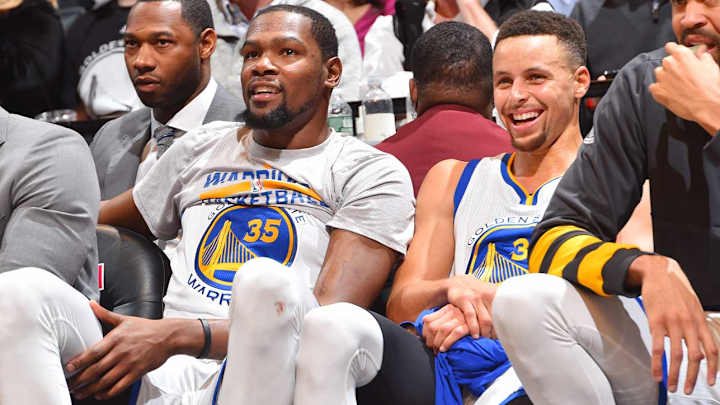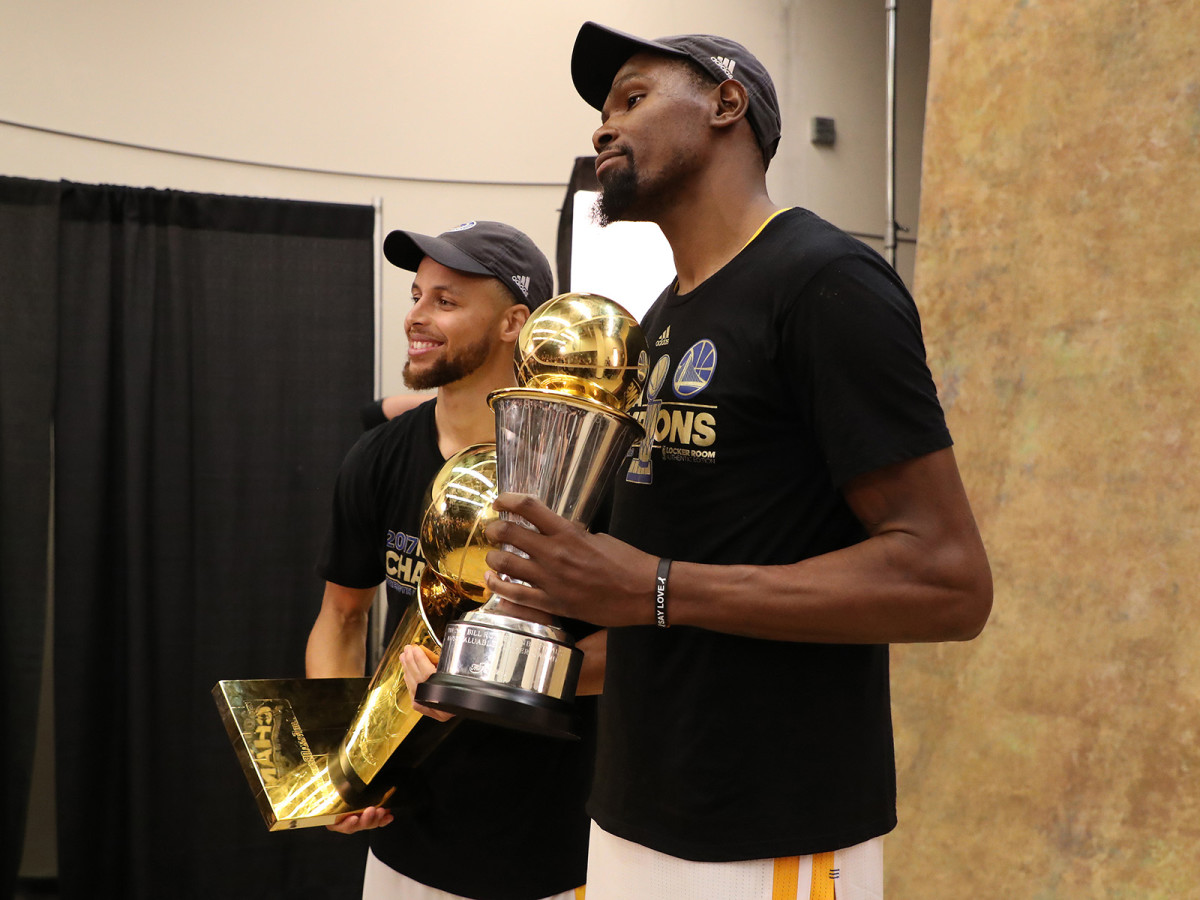Mind the Gap: The NBA's Lack of Competitive Drama Is a Bummer

If Kevin Durant wasn’t speaking on behalf of the Warriors, it sure as hell sounded like he was. The reigning Finals MVP was on the other side of the world last week when he weighed in on the latest melodrama of this silly summer across the NBA. “I don’t really care about the Kyrie Irving situation,” Durant said while on a trip to the league’s academy in India.
He probably didn’t realize it in the moment, but Durant had just offered a succinct articulation of how Golden State should react to a trade request that has roiled its likely Finals opponent for the fourth consecutive season. His remark doubles as the most appropriate response to the flurry of activity that has dominated the sports news cycle and repeatedly heated NBA Twitter to its boiling point over the last two months. You should shrug your shoulders and try to delude yourself into getting amped up about the regular season, because the Warriors looked close to invincible on their way to their second title in three years last June, and the gap between them and the rest of the NBA has widened since then.
Which Team Should Trade for Kyrie Irving?
For the fans of the other 29 teams in the league, this is a sad state of affairs with a range of causes preceding the summer of 2017, from the rejection of a proposal to smooth the salary cap spike to a conveniently timed contract extension for the best shooter ever to an undersized second-round pick’s emergence into a killer Swiss–Army Knife. But the Warriors needed a few things to fall their way during free agency this year to ensure their glorious ride wouldn’t end soon.
Durant was the top item on the agenda. He had the potential to throw a wrench into the Warriors’ off-season order of operations as they set about trying to reassemble an all-galaxy rotation within the constraints of a salary cap that came in well below previous projections. Not only did Durant enter negotiations open to the possibility of taking less than his maximum to grease the wheels for other roster additions, he handed the Warriors a steep discount and a slashed luxury tax bill, signing for $53 million over two years in an ultimate team-first move a year after enduring withering criticism over his purported disloyalty to a different team. Golden State is headed for a financial reckoning, but Durant’s pay cut could extend their window.
By the time he re-upped with the Warriors, they had already agreed to bring back their flame-throwing two-time MVP on a supermax deal, reached reasonable contracts with important role players Shaun Livingston and David West and navigated a hairy standoff with an even more important role guy that included brief flirtations with a pair of West rivals. Andre Iguodala’s three-year, $48 million pact cleared the biggest non-Durant hurdle to the return of Golden State’s Hamptons 5, but the Warriors weren’t about to settle for running it back with the same team that wiped the floor of everyone standing in their way while running up a 16–1 postseason record this spring. They got better.

Nabbing Omri Casspi on the veteran’s minimum was a prudent, low-cost pickup for the Warriors. He’s never appeared in a playoff game, but it’s hard to see how a 6’9’’ shooter who guards just enough to merit the NBA’s favorite player type buzzword won’t thrive as a complementary piece in an offense programmed to space the floor and create open looks beyond the arc. The other wing addition Golden State made one day after the Casspi move—inking Nick Young for the full taxpayer mid-level exception—is trickier to assess, but he’s only a few months removed from the best three-point shooting season of his career on a Lakers team mostly focused on amassing ping-pong balls, not wins. Young will have a lot more to play for in 2017–18.
The Warriors’ purchase of Oregon product Jordan Bell, a rangy stopper who can corral ball handlers on the perimeter and protect the rim, registered as a savvy front-office steal by Bob Myers's group. And last year's discovery, second-round pick Pat McCaw, turned in an encouraging performance in Las Vegas and could be ready to contribute in a bigger way, as well.
JaVale McGee’s one-year deal, which followed an earlier one-year pact for fellow veteran center Zaza Pachulia, filled Golden State’s 15th roster spot. When the Warriors put out a press release last week noting they had re-signed Curry, Durant, Iguodala, Livingston, Pachulia and West, it felt like a novelist announcing he was ready to unveil a sequel a couple of months after winning the Nobel Prize for his first volume. “Key Members of 2017 NBA Championship Team Returning to Golden State,” the release notes. The matter-of-fact way the Warriors told the world they were getting the band back together is standard for team-issued statements, but it still helped put into perspective the hectic horse trading elsewhere around the league.
When the dust settled on free agency and a wild window of trades, the NBA landscape had clear dividing lines and an even clearer alpha dog. There was a talent-drained East with one title contender (Cleveland), one sweat-it-out darkhorse (Boston), an amorphous mass of pretenders and rebuilders, and the New York Knicks. The West is defined by a glut of improved squads with the potential to make runs into late May and a few outfits with intriguing cores on the right side of the aging curve. Golden State sits above it all, with a sizeable gulf of if-everything-breaks-right upset hopes beneath them. That space increased during free agency, as the Warriors handled their business without any fuss while watching the rest of the league scramble to retrofit their rosters to counter their collection of All-NBA studs and snug-fitting rotation pieces. Golden State’s summer amounted to a Pimp My Ride episode where instead of taking on some beaten up 1985 Jeep, Xzibit showed up in the driveway to find a Rolls Royce Phantom with suicide doors. We’re going to need to come up with a more attractive betting proposition than “Warriors or the field?,” because the answer is too simple right now.
Will the Rockets' Superstar Experiment Be a Boom or Bust?
The biggest unresolved plot twist before the start of the season is Irving’s future. He could be dealt tomorrow. He could arrive at training camp for a super-awkward scene with LeBron. Or the Cavaliers could keep him and try to dangle him before the trade deadline. Whatever the final outcome, short of Cleveland fleecing some desperate team into a Melo-to-the-Knicks-type haul, there is no plausible scenario in which the Cavaliers will enter this season any closer to beating Golden State in a seven-game series than they were when they shuffled out of Oracle Arena six weeks ago. Cleveland parted ways with its general manager three days before the draft and less than two weeks before the start of free agency. Its biggest “upgrade” this off-season was an over-the-hill point guard who can’t be bothered to defend anyone. And its second biggest was the result of a mysterious mind trick: the Cavaliers became the 38th team to convince themselves that Jeff Green might be a useful basketball player.
The Warriors’ undisputed status as the NBA's 2017-18 frontrunner could foster a sort of fatalism that sucks the fun out of watching other teams from mid-October to April. That feeling really took hold toward the end of last season, right about the time when Golden State ripped off a 13-game winning streak as Durant sat out while recovering from an MCL sprain, and it’ll probably creep into the national conversation even earlier this season. There’s no way around it: The lack of competitive drama is a bummer. Still, that shouldn’t take away from the excitement of following other compelling storylines around the league, including, as Durant put it, "the Kyrie Irving situation." His fate could fundamentally reorient the Cavaliers’ team-building plans, lay the groundwork for the league’s best player leaving town a year from now and furnish a franchise cornerstone in a different time zone. But Durant isn’t all that interested in how it shakes out, and his team ought to be taking the same approach.
